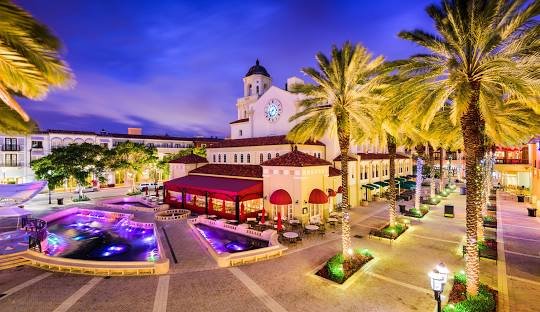West Palm Beach is a thriving city in southeastern Florida known for its rich history, tropical climate, and growing economy. As the county seat of Palm Beach County, it plays a central role in South Florida’s development, attracting tourists, residents, and businesses alike. Located just 70 miles north of Miami, the city offers a unique blend of urban energy and relaxed coastal living, making it one of Florida’s most attractive destinations.
Founded in 1894 by Henry Flagler, a railroad magnate, West Palm Beach is one of the oldest cities in South Florida. It was established as a commercial hub to support the nearby resort town of Palm Beach, which Flagler also helped develop. Over the decades, the city has grown from a small settlement into a bustling metropolitan center, with a current population of around 120,000 people. It forms part of the Miami metropolitan area, which is home to over 6 million residents.
West Palm Beach covers approximately 58 square miles and sits just a few feet above sea level. Though it is not directly on the Atlantic Ocean, it lies across the Intracoastal Waterway from Palm Beach Island, which boasts some of the region’s most beautiful beaches. The city’s location allows residents and visitors to enjoy waterfront views, outdoor recreation, and a mild, tropical climate throughout the year. Average summer temperatures hover around 90 degrees Fahrenheit, while winters remain comfortable at around 60 degrees. The city experiences the most rainfall between May and October and is within the Atlantic hurricane zone from June to November.
The city is known for its diversity and cultural vibrancy. It is home to a mix of communities, including a strong Hispanic and Caribbean-American presence. Over the years, West Palm Beach has seen growth in its Haitian, Brazilian, and African American populations. This diversity is reflected in the city’s food, art, music, and festivals, such as SunFest, which is one of Florida’s largest waterfront music events.
Tourism remains a key part of the local economy, but West Palm Beach has diversified significantly. Real estate, health care, finance, and small businesses play major roles in the economic landscape. In recent years, the city has also seen a rise in tech startups and the relocation of financial firms from other major cities like New York. This trend has helped strengthen the city’s job market and attract new talent and investment. The downtown area, especially Clematis Street and the Rosemary Square district, has been revitalized with shops, restaurants, and entertainment venues.
Transportation in West Palm Beach is well developed. Palm Beach International Airport provides domestic and limited international flights, while the Brightline high-speed rail connects the city to Miami, Fort Lauderdale, and Orlando. I-95 and Florida’s Turnpike offer convenient road access to other parts of the state. Local transit is provided by Palm Tran, and improvements continue to be made to encourage walkability and biking in urban areas.
Education and culture are also focal points in West Palm Beach. The city is home to Palm Beach Atlantic University, a private Christian university, and Palm Beach State College, which serves a broad student base. Cultural institutions such as the Norton Museum of Art and the Kravis Center for the Performing Arts contribute to a vibrant arts scene. Other notable attractions include the Palm Beach Zoo, Mounts Botanical Garden, and the South Florida Science Center.
West Palm Beach continues to balance growth with quality of life. With a mix of historic charm, modern development, and a welcoming climate, the city has established itself as a prime destination for both visitors and long-term residents. Its evolving infrastructure, cultural diversity, and economic momentum make it a key player in the future of South Florida.







